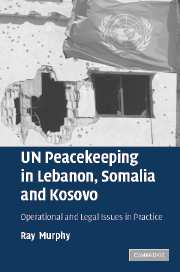Crossref Citations
This Book has been
cited by the following publications. This list is generated based on data provided by Crossref.
2008.
BIBLIOGRAPHY.
Leiden Journal of International Law,
Vol. 21,
Issue. 1,
p.
229.
Greener, B. K.
2009.
The New International Policing.
p.
32.
Goodman, Ryan
2010.
Yearbook of International Humanitarian Law.
p.
53.
Lemay-Hébert, Nicolas
2013.
Everyday Legitimacy and International Administration: Global Governance and Local Legitimacy in Kosovo.
Journal of Intervention and Statebuilding,
Vol. 7,
Issue. 1,
p.
87.
2017.
The International Responsibility of International Organisations.
p.
203.
Reilly, Niamh
2018.
How Ending Impunity for Conflict-Related Sexual Violence Overwhelmed the UN Women, Peace, and Security Agenda: A Discursive Genealogy.
Violence Against Women,
Vol. 24,
Issue. 6,
p.
631.
Gilder, Alexander
2019.
The Effect of ‘Stabilization’ in the Mandates and Practice of UN Peace Operations.
Netherlands International Law Review,
Vol. 66,
Issue. 1,
p.
47.
Kaiser, Md Shahidulla
and
Sohaib, Mohammad
2021.
No Poverty.
p.
376.
Henke, Marina E.
2021.
The Palgrave Encyclopedia of Peace and Conflict Studies.
p.
1.
Kaiser, Md Shahidulla
and
Sohaib, Mohammad
2021.
No Poverty.
p.
1.
Salleh, Asri
and
Idris, Asmady
2021.
Malaysia’s United Nations Peacekeeping Operations (1960–2010).
p.
65.
Salleh, Asri
and
Idris, Asmady
2021.
Malaysia’s United Nations Peacekeeping Operations (1960–2010).
p.
1.
Skorokhod, Yu.
2021.
FORMATION OF UNITED NATIONS INTERIM FORCE IN LEBANON-II: NEGOTIATING ASPECT.
Bulletin of Taras Shevchenko National University of Kyiv. International relations,
p.
4.
Voetelink, Joop
and
van Hoek, Bas
2021.
Military Operations and the Notion of Control Under International Law.
p.
107.
Zvîncă, Gabriel
2022.
The Metamorphoses of the UN Peacekeeping Principles: How the End of the Cold War Reshaped Them (1988–1992).
Acta Musei Napocensis. Historica,
p.
279.
Elayah, Moosa
2022.
Europe and the MENA Region.
p.
47.
Henke, Marina E.
2022.
The Palgrave Encyclopedia of Peace and Conflict Studies.
p.
462.
Sabuj, Mohammad
2023.
Multidisciplinary Futures of UN Peace Operations.
p.
151.
Rogers, Roy Anthony
and
Safiyanu, Sani
2023.
The Role of Personalities in Nigeria’s Peacekeeping Operations in Africa.
Journal of Asian and African Studies,





